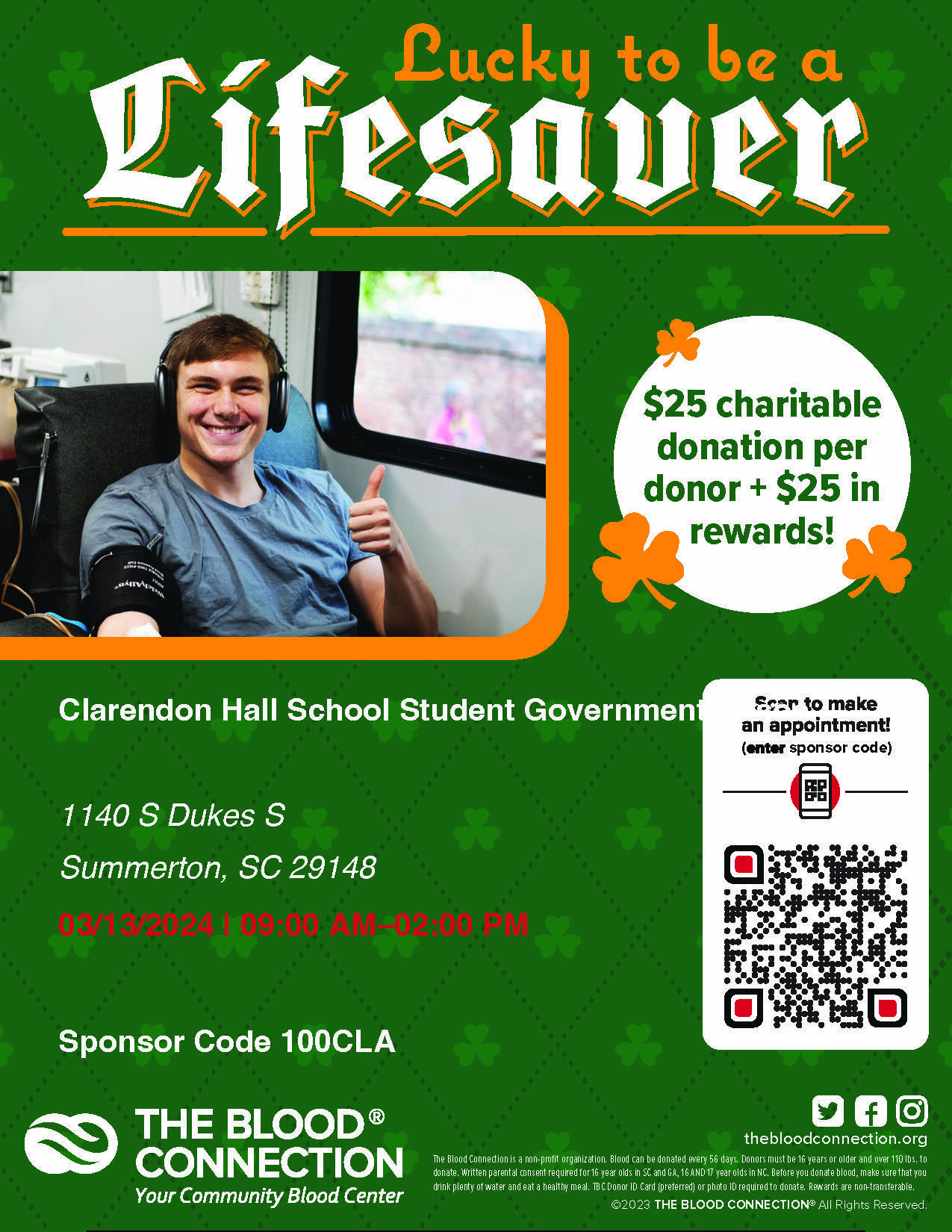Clarendon school will host blood drives in March, April
Clarendon County residents are invited to participate in a blood drive at a local school in March and April.
According to Lacey Corbett, a senior at Clarendon Hall in charge of the blood drives at the school, the school hosts blood drives every school year through The Blood Connection organization.
With Saint Patrick's Day in March, the next blood drive will be called "Lucky to be a lifesaver" and will be held March 13 from 9 a.m. to 2 p.m. at 1140 S. Duke St. in Summerton.
"Blood products cannot be created in a lab - they must be donated - so it is imperative that we as a community roll up our sleeves to help patients in our community," said Rachel Gainey, chief executive officer of McLeod Health Clarendon.
Donors must be at least 16 years old, have written parental consent and weigh at least 110 pounds.
According to The Blood Connection website, a needle will be placed in your arm to remove approximately one pint of blood. The blood will flow through the tubing attached to the needle into a collection system. The process will take approximately 10 to 15 minutes. Your body will replace the liquid part of your blood (called plasma) in just a few hours, and the blood cells will be replaced within a few weeks. Whole blood donors can donate every 56 days.
Donating blood helps patients of all ages, including accident and burn victims, heart surgery and organ transplant patients and those battling cancer. According to the Red Cross Blood Donation website, every two seconds someone in the United States needs blood.
In January, American Red Cross announced an emergency blood shortage. Reporting from ABC News states the number of blood donors has fallen 40% in the last two decades. American Red Cross said it is experiencing the lowest number of people giving blood in the last 20 years.
"One of the most distressing situations for a doctor is to have a hospital full of patients and an empty refrigerator without any blood products," said Dr. Pampee Young, chief medical officer of the Red Cross, the nation's largest blood supplier. "A person needs lifesaving blood every two seconds in our country - and its availability can be the difference between life and death; however, blood is only available thanks to the generosity of those who roll up a sleeve to donate."
According to a news release from American Red Cross, when fewer people donate blood, even small disruptions to blood donations - such as the nearly 7,000-unit shortfall in blood donations the Red Cross experienced between Christmas and New Year's Day alone - can have a huge impact on the availability of blood products and dramatic consequences for those in need of emergency blood transfusion.
According to the school's flyer for the event, there will be a $25 charitable donation per donor and $25 in rewards for donors. Donations can be given through appointments and can be made by scanning the QR code on the flyer for the event and entering the sponsor code 100CLA or by calling Clarendon Hall to schedule an appointment.
If you can't make it to Clarendon Hall for its blood drive, McLeod Health Clarendon is also hosting one on March 27 from 10 a.m. to 3 p.m. partnered with The Blood Connection as well. All blood donated to The Blood Connection in Clarendon benefits McLeod Health Clarendon. The date for Clarendon Hall's April blood drive has not yet been set.
"When you donate blood with The Blood Connection, that blood remains local and directly supports patients within our hospital system. Each donation could save up to three lives," Gainey said. "Together, we can continue to ensure the health and well-being of our community through a stable local blood supply."
More Articles to Read

